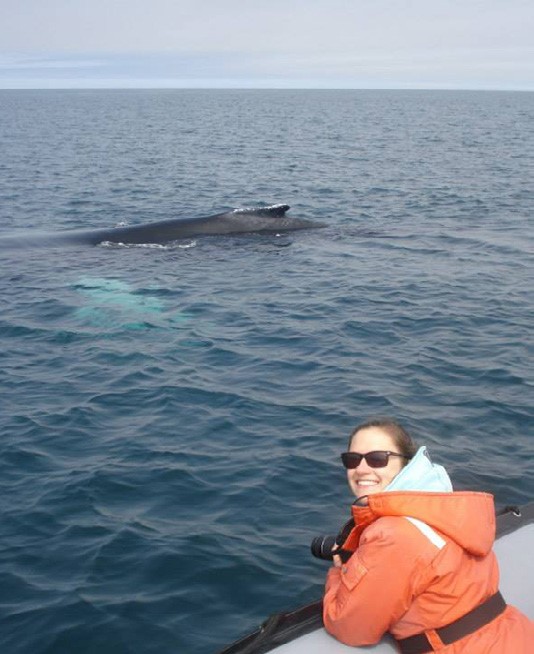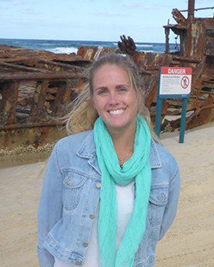Past Interns
2019
Nadia Dalili, Master of Marine Management candidate
WWF-Canada Research Intern: Mitigating shipping impacts on at-risk whales: Lessons learned from Canada
Whales are not only at the top of the food chain with an important role in overall oceans health, but their large size, charisma and mythical aura have made them an iconic group of species that have captivated people’s attention for centuries. WWF-Canada has worked with many partners to establish voluntary measures and best practices to reduce the impacts of fishing and shipping on endangered whale populations. However, Canada has a poor track record in recovering species, with at-risk populations continuing to decline by an average of 28 per cent since the Species at Risk Act was introduced in 2002. A 2018 report from the Canadian federal environment commissioner heavily criticized the failure of the government to apply existing policies and tools to proactively manage threats to marine mammals from commercial fishing and marine vessels. While some whale species are showing signs of recovery, many remain at risk and are now facing increasing threats, such as underwater noise, ship strikes, entanglement with fishing gear, and changes to prey availability in response to a changing climate. New approaches and immediate action are needed to create a future where humans can live in harmony with these iconic species.
WWF-Canada, as part of its National Shipping Initiative, has set the goal to reduce ship strikes and underwater noise to at-risk whales in Canada. WWF-Canada is currently involved in a 3-year project focusing on stewardship of the marine industry for cetacean’s conservation in the Northwest Atlantic Canada. As part of this project, WWF and partners will develop several tools to facilitate and improve an opportunistic whale data collection program for the industry. Participation in whale data collection is a requirement to achieve a higher level of compliance with Green Alliance underwater noise indicator and as such, involvement of the industry in data collection has drastically increased over the last few years. To support this initiative and provide recommendations to the program, Nadia’s research focused on quantifying the use and value of opportunistic sightings data in the management and conservation of cetaceans in Canada.
Nadia conducted over a dozen of semi-structured interviews with academia, governments, and NGOs across the country to gather perspectives and quantify the value (when, where and for what purpose) opportunistic observations of cetaceans can support conservation and management decision making and similarly quantify their limitations of doing so.
Pr iyanka Varkey, Master of Marine Management candidate
iyanka Varkey, Master of Marine Management candidate
WWF-Canada Research Intern:Reducing Plastic Pollution in Nova Scotia
Marine debris, specifically in the form of plastic pollution, is pervasive in the marine environment. It has been found on remote islands far from any human habitation, and at the greatest depths of the ocean. Microplastics, which form when larger pieces of plastic degrade, are even making their way into the seafood we eat. From entanglement to ingestion, marine debris has created a new anthropogenic threat to our oceans. Marine debris is garnering international attention. The United Nations Sustainable Development Goal 14: Life Below Water aims to, “By 2025, prevent and significantly reduce marine pollution of all kinds, in particular from land-based activities, including marine debris and nutrient pollution.” Canada is beginning to take notice of this issue, banning microbeads at the beginning of 2018, but more work is needed to stem the tide of plastic pollution entering our oceans.
WWF-Canada’s Nature Sans Plastic campaign aims to reduce the amount of plastic entering waterways through encouraging grassroots actions such as participating in Great Canadian Shoreline Cleanups, reducing personal plastic use, and advocating for other reductions. Following on a report created for WWF-Canada, strategies to reduce plastic pollution, such as bans, or voluntarily plastic reductions, have been identified, but there is a need to determine which would be best suited to local realities.
Working in collaboration with Coastal Action, the Clean Foundation, and the Business Improvement Districts of the Halifax Regional Municipality, Priyanka conducted outreach and gathered information to adapt the Ocean Friendly Nova Scotia initiative for Halifax. This tiered-certification system, developed by Coastal Action, recognizes businesses that have or are willing to eliminate three or more single-use plastic (SUP) items from their regular use. She conducted community surveys to gauge how interested Haligonians are in reducing their use of SUPS and if they would be more likely to support businesses participating in the Ocean Friendly Nova Scotia initiative. She also conducted surveys interviews with local businesses to determine their interest in the program and see what support they would need. The aim of the research is to support the adaptation of the Ocean Friendly Nova Scotia initiative in the Halifax Regional Municipality.
Emily Vaniderstine Master of Marine Management candidate
WWF-Canada Research Intern: Opportunities and barriers to ecotourism in Marine Protected Areas in Nova Scotia
Around the world, significant investment has been made to create recreational opportunities, increase visitation and use, and enhance the benefits generated by protected areas, in particular through ecotourism. A 2017 report prepared by Gardner-Pinfold for Nova Scotia Environment on the Commercial Benefits of Nova Scotia’s Protected Areas showed significant com
mercial and socioeconomic benefits from protected areas, including businesses offering services that directly
use protected areas (such as kayak outfitters and hunting guides), or benefit from indirect relationships with protected areas, such as accommodations operators, hunting or fishing camps, educators, and non-profit organizations. Interviews with key stakeholders identified that having a protected area nearby created a positive investment climate, supported unique business models and generated business revenue through direct attraction of clients, and that these opportunities could be further enhanced. The report also highlighted barriers to the development of tourism associated with protected areas including lack of infrastructure; lack of public awareness of the importance and potential of protected areas; and perceptions that protection equates to limited use. It is important to note that this study only focused on the terrestrial environment.
Nova Scotia, “Canada’s Ocean Playground”, is looking to grow its tourism industry from $2.6 billion annually in 2016 to $4 billion annually by 2024. Initiatives such as the Wild Islands Tourism Advancement Partnership, aimed at increasing opportunities for nature-based tourism experiences in Nova Scotia, indicate the province’s desire to expand tourism focused on the environment. With Canada committed to protecting at least 10% of its ocean and coastal areas by 2020, growth in the ecotourism industry could come through the creation of marine protected areas (MPAs).
Emily’s research aimed at surveying Nova Scotia tourism operators and tourists’ perceptions of marine protection in order to better understand how marine protection is perceived by the tourism sector and the factors, including naturalness, environmental, and protection designation, influencing tourists’ decisions to visit an area or engage in particular ecotourism activities.
2018
Krysten Lyons, Master of Resource and Environmental Management candidate
WWF-Canada Research Intern: Operationalizing Ecosystem-based Fisheries Management in Atlantic Canada
Forage fish such as herring, capelin and mackerel play a critica role in marine ecosystems and the economy of Atlantic Canada. Acting as an energy link, they connect the base of the food web with higher trophic levels. As such, a change in forage fish abundance, or a shift in their distribution can have a significant impact on their dependent predators. In addition to their ecological role, forage fish support commercial, recreational, and food, social and ceremonial fisheries in Atlantic Canada. However, forage fish are highly sensitive to environmental conditions and therefore physical variables such as water temperature can have a significant impact on their abundance. Given the key role of forage fish within ecosystems, their socio-economic and cultural importance, and the sensitivity of forage fish to environmental conditions, a holistic approach to management is necessary to effectively build and maintain healthy fish stocks.
Ecosystem-based fisheries management (EBFM) is an inclusive form of management which can incorporate social and economic factors in addition to physical and ecological data, and which explicitly recognizes the complexity of a given system. It has been discussed in the peer-reviewed literature for several decades, during which time the definition of EBFM has continuously evolved. Governments and organizations at the national and international level have incorporated EBFM into their management goals and objectives. However, despite a large published knowledge base, and the apparent willingness of organizations to adopt an EBFM approach, there continues to be a gap between knowledge and action, with the actualization of EBFM lagging behind the theoretical discourse.
Given the potential for an EBFM approach to effectively tackle complex issues such as the management of forage fish, and the practical difficulties associated with implementing it, Kristyn’s internship investigated how to operationalize EBFM in Atlantic Canada. Her work included evaluating the current status of EBFM within Integrated Fisheries Management Plans for forage fish and their predators in Atlantic Canada, and developing a suite of recommendations for improving the implementation of EBFM within the current management framework.
Riley Schnurr, Master of Resource and Environmental Management candidate
WWF-Canada Research Intern: Understanding Marine Debris
Marine debris, specifically in the form of plastic pollution, is pervasive in the marine environment. It has been found on remote islands far from any human habitation, and at the greatest depths of the ocean. Microplastics, which form when larger pieces of plastic degrade, are even making their way into the seafood we eat. From entanglement to ingestion, marine debris has created a new anthropogenic threat to our oceans. Marine debris is garnering international attention. The United Nations Sustainable Development Goal 14: Life Below Water aims to, “By 2025, prevent and significantly reduce marine pollution of all kinds, in particular from land-based activities, including marine debris and nutrient pollution.” Canada is beginning to take notice of this issue, banning microbeads at the beginning of 2018, but more work is needed to stem the tide of plastic pollution entering our oceans.
debris, specifically in the form of plastic pollution, is pervasive in the marine environment. It has been found on remote islands far from any human habitation, and at the greatest depths of the ocean. Microplastics, which form when larger pieces of plastic degrade, are even making their way into the seafood we eat. From entanglement to ingestion, marine debris has created a new anthropogenic threat to our oceans. Marine debris is garnering international attention. The United Nations Sustainable Development Goal 14: Life Below Water aims to, “By 2025, prevent and significantly reduce marine pollution of all kinds, in particular from land-based activities, including marine debris and nutrient pollution.” Canada is beginning to take notice of this issue, banning microbeads at the beginning of 2018, but more work is needed to stem the tide of plastic pollution entering our oceans.
During his internship, Riley created a report that aimed to identify the global scale of marine debris for both macro and micro plastics, including major sources of pollutants and interactions between debris and wildlife. Statistics for Canada were highlighted, and a jurisdictional scan done to identify what levels of government have authority over specific types of pollutants. Riley provided an overview of actions being led to reduce marine debris globally, nationally and locally for Canada, including what actions are being led by other environmental organizations. The aim of this research was to identify areas where more attention is needed, highlighting what actions could be taken by WWF-Canada to tackle this issue.
Leah Sneddon, Master of Marine Management candidate
WWF-Canada Research Intern: Community Supported Marine Protection
Canada has commitments to protect 10 per cent of its ocean and coastal waters by 2020. While Canada currently has 7.75 per cent of its oceans protected in marine protected areas (MPAs) and other effective area-based conservation measures (OECMs), most of these protected sites are offshore and far from communities. Coastal areas, which tend to be of high use by many sectors, are also in need of protection, as they often contain sensitive spaces and species. Many coastal communities also rely on the use of the ocean, providing food, jobs, recreation and having importance to local cultural values.
The creation of new MPAs can cause concern in communities and amongst user groups about potential loss of income or restrictions from using the area in question. In Canada, MPA designations are mostly top-down processes that can be stopped or slowed due to community opposition, such as the perception that marine protection comes at the expense of local access and livelihoods. Understanding community values and supporting a bottom-up process to marine protection helps lead to equitable MPA establishment where those impacted have a say in MPA governance, monitoring and management.
WWF-Canada advocates for marine protection and planning and the sustainable use of marine resources. Community engagement underpins much of our work, and WWF partners with Indigenous and other coastal communities on all three coasts, integrating traditional and local knowledge into marine protection. Leah’s research supported a bottom-up approach to marine protection on Canada’s Pacific and Atlantic Coasts.
On the west coast, WWF-Canada signed an historic agreement in 2016 with the Gitga’at Nation in British Columbia to further shared goals of marine protection and community prosperity. Leah reviewed global examples of indigenous protection and governance which helped examine common areas of interest for marine protection in Gitga’at Territory and potential options for their conservation.
On the east coast, WWF-Canada is working to support a bottom-up process to MPA establishment with residents of the Eastern Shore of Nova Scotia. The waters off the Eastern Shore have been identified as an Area of Interest by Fisheries and Oceans Canada and has begun the designation process to become a MPA under the Oceans Act. Leah has been using this area as a case study to investigate collaborative governance and determine what barriers (social, economic, political and cultural) limit or can facilitate the application of a bottom-up management approach to coastal MPAs.
2017
Joana Costa, Master of Marine Management candidate
WWF-Canada Research Intern: Community benefits from coastal marine protected areas in Canada
Canada is c ommitted to protecting 10% of its ocean and coastal spaces by 2020. Currently, only around 1% of Canada’s oceans are contained within marine protected areas (MPAs), with the majority of protection occurring offshore and far from communities. Coastal areas are also in need of protection, as they often contain sensitive spaces and species. Creating coastal MPAs could have benefits for the communities adjacent to them, and bring awareness to the need for more marine protection in general. However, the creation of new MPAs can cause concern in communities and user groups about potential loss of income or restrictions from using the area in question. Demonstrating that MPAs can have economic and social benefits can help alleviate concerns among stakeholders, and help gain support for designation. Joana’s research will focus on potential community benefits for coastal MPAs in the Canadian context. Furthermore, she will conduct stakeholder engagement in coastal communities to identify perceptions of MPAs. The reported results at the end of her internship will help WWF-Canada further their commitment towards implementing high standard, community supported MPAs.
ommitted to protecting 10% of its ocean and coastal spaces by 2020. Currently, only around 1% of Canada’s oceans are contained within marine protected areas (MPAs), with the majority of protection occurring offshore and far from communities. Coastal areas are also in need of protection, as they often contain sensitive spaces and species. Creating coastal MPAs could have benefits for the communities adjacent to them, and bring awareness to the need for more marine protection in general. However, the creation of new MPAs can cause concern in communities and user groups about potential loss of income or restrictions from using the area in question. Demonstrating that MPAs can have economic and social benefits can help alleviate concerns among stakeholders, and help gain support for designation. Joana’s research will focus on potential community benefits for coastal MPAs in the Canadian context. Furthermore, she will conduct stakeholder engagement in coastal communities to identify perceptions of MPAs. The reported results at the end of her internship will help WWF-Canada further their commitment towards implementing high standard, community supported MPAs.
Kent Noonan – Master of Resource and Environmental Management candidate
WWF-Canada Research Intern: Offshore wind development in Canada

Marine renewable energy development is an emerging industry worldwide, with new renewable energy sources needed to help reduce fossil fuel use. With over a two-decade history of development in Europe, offshore wind has yet to become a reality in Canada. Kent’s internship will involve conducting a scoping study to better understand the offshore wind industry worldwide, with a specific focus on the potential environmental and social impacts of developing this type of technology. He’ll then research the state of play in Canada, exploring past and currently proposed projects, the regulatory system for permitting these type of operations, and opportunities of and barriers to development. Kent’s internship report will lead to the development of recommendations to best further offshore wind development in Canada.
Stephanie Taylor – Master of Resource and Environmental Management Candidate
WWF-Canada Research Intern: Alternative lobster bait in Atlantic Canada
 WWF-Canada released a report on Canada’s forage fisheries, Food for All, that assessed 27 Canadian fisheries for forage fish, including capelin, mackerel and both Atlantic and Pacific herring. The report stressed the need to look more closely at these species, which play a critical role in maintaining populations of other commercial and non-commercial species in Canada. Both Atlantic herring and mackerel are used as traditional bait in lobster fisheries. Due to the decline of local populations of herring and mackerel, these MSC certified fisheries are required to provide evidence that they are not hindering the recovery and rebuilding of the Canadian mackerel stock. Information is scattered in a few publications; therefore, a comprehensive understanding of practices, uses, market drivers and bait options is needed to determine the vulnerability of lobster fisheries and fishing communities in Atlantic Canada and how they are able to adapt. Stephanie’s internship will examine the issues and specific characteristics of alternative bait for the lobster fisheries in Atlantic Canada. Her work will consist of desk-top research, discussions with relevant partners, and potential site visits. Stephanie’s internship will involve: (i) compiling data on current and feasible alternative baits, (ii) outlining license regulations around bait and bycatch (including the use/practices of these bycaught species as bait), (iii) surveying stakeholders in the bait industry to help obtain an understanding of current practices, and (iv) providing recommendations. Stephanie’s internship will support WWF’s Forage Fish Campaign on finding alternative bait for the lobster fisheries in Atlantic Canada. Her analysis of survey results and existing information will be integral to an industry workshop on bait in late 2017
WWF-Canada released a report on Canada’s forage fisheries, Food for All, that assessed 27 Canadian fisheries for forage fish, including capelin, mackerel and both Atlantic and Pacific herring. The report stressed the need to look more closely at these species, which play a critical role in maintaining populations of other commercial and non-commercial species in Canada. Both Atlantic herring and mackerel are used as traditional bait in lobster fisheries. Due to the decline of local populations of herring and mackerel, these MSC certified fisheries are required to provide evidence that they are not hindering the recovery and rebuilding of the Canadian mackerel stock. Information is scattered in a few publications; therefore, a comprehensive understanding of practices, uses, market drivers and bait options is needed to determine the vulnerability of lobster fisheries and fishing communities in Atlantic Canada and how they are able to adapt. Stephanie’s internship will examine the issues and specific characteristics of alternative bait for the lobster fisheries in Atlantic Canada. Her work will consist of desk-top research, discussions with relevant partners, and potential site visits. Stephanie’s internship will involve: (i) compiling data on current and feasible alternative baits, (ii) outlining license regulations around bait and bycatch (including the use/practices of these bycaught species as bait), (iii) surveying stakeholders in the bait industry to help obtain an understanding of current practices, and (iv) providing recommendations. Stephanie’s internship will support WWF’s Forage Fish Campaign on finding alternative bait for the lobster fisheries in Atlantic Canada. Her analysis of survey results and existing information will be integral to an industry workshop on bait in late 2017
2016
Jordan Gardiner – Master of Marine Management
“The fact that we know more about space than the marine world astounds me. Without marine conservation, we accept the fact that we may never fully understand the marine world and could lose out on a whole array of uses. Marine conservation helps sustain the current uses of the oceans and allow for future exploration and understanding of them.”
Jordan’s research helped launched the WWF-Canada Forage Fish Campaign, a conservation project aimed at conserving small but abundant fish that play a crucial role in marine food chains. Jordan studied the market and trade of forage fish in Canada by reviewing industry and science publications, interviewing Department of Fisheries and Oceans (DFO) managers, understanding fishing license conditions and speaking with other stakeholders.
This research uncovered the commercial market value of different species of forage fish, confirmed existing knowledge about the markets and identified certain gaps in information, such as how much forage fish is being caught and sold and where the products end up. These findings revealed a lack of transparency on the use of forage fish in bait fisheries with little to no monitoring of catch by fisheries, as well as privacy issues when dealing with buyers and retailers. However, working with DFO and other stakeholders helped WWF-Canada build relationships with key players that are needed to engage, and increase awareness, about the importance of these fish species.
Kareina D'Souza - Master of Resource and Environmental Management
 “I have always been drawn to the ocean and I think we tend to forget how vital it is to our survival. Marine conservation helps connect us to the ocean, and protect one of our most valuable resources.”
“I have always been drawn to the ocean and I think we tend to forget how vital it is to our survival. Marine conservation helps connect us to the ocean, and protect one of our most valuable resources.”
Kareina’s research with the WWF Canada Oceans team in 2016 built upon Sarah Saunders’s research from three years ago studying the effectiveness of marine protection in Canada. Specifically, Kareina reviewed the International Union for Conservation of Nature’s (IUCN) standards for MPAs, which are considered the gold standard for effective protection of species and ecosystems by the global conservation community. She then scored the protection standards of eight existing Canadian MPAs and four National Marine Conservation Areas (NMCAs) against the IUCN criteria.
Kareina’s results showed that none of the protected areas designated and managed by the DFO and Parks Canada neither met or came close to the IUCN standard. The most significant factor in these protected areas failing to meet the IUCN standard was inefficient or a complete lack of monitoring. Without robust management, monitoring efforts and target plans, the effectiveness of protection in helping species and ecosystems thrive cannot be determined.
Kareina developed a set of recommendations based on the IUCN’s four pillars of performance of protected areas—design, governance, management and independent review—to help improve the conservation benefits of Canada’s marine protected areas. These recommendations will help WWF-Canada support the federal government’s effort to increase marine protection by presenting the research throughout the marine protected area network planning processes. Sharing the report with park managers, NGOs and other interested stakeholders will help them better understand the WWF-Canada position.
2015
Stephanie Maasik – Master of Resource and Environmental Management
WWF-Canada Research Intern: Bycatch Solutions for at Risk Marine Species in Canada

One of the main threats to many at risk Canadian marine species is from bycatch in fishing operations. Stephanie Maasik’s internship with WWF will entail the analysis of fishing threats to select at risk marine species for which bycatch is a main contributor to their recovery. Potential species could include North Atlantic right whales, porbeagle and Greenland sharks and leatherback and loggerhead sea turtles. The ultimate goal of her work will be to provide recommendations on measures industry and government could undertake to reduce the impact of fisheries on these vulnerable species. To do this, Stephanie will conduct a multi-faceted approach involving examining industry best practices, market incentives and government regulations and may also include reviewing mitigation measures and incentives that have been implemented internationally to determine which could be used in Canada to address this threat. Stephanie’s analysis will be integral to a workshop WWF-Canada will be hosting in late 2015 on bycatch impacts on at risk marine species.
Rebecca Zimmerman – Master of Resource and Environmental Management
WWF-Canada Research Intern: Impact of Ocean Acidification on Shelled Organisms in Northwest Atlantic

CO2 emissions are making the world’s oceans more acidic and warmer, with worrisome implications for marine life and nature-based economies. Acidifying waters can harm the eggs and larvae of marine creatures and interfere with their ability to build shells.
From May to August, 2015, Rebecca Zimmerman will compile available evidence for or against potentially negative effects of warming and acidification on shelled organism in the Northwest Atlantic, with particular reference to impacts on lobsters, scallops, clams and krill in the Bay of Fundy /Gulf of Maine. This study will include the compilation and synthesis of data on seafood industry responses and conservation/adaptation measures to these threats.
2014
Ainsley Allen: Master of Marine Management
Ainsley's internship entails an environmental analysis of the overall footprint of oil and gas activities in Canada’s oceans and their ecological impacts. The investigation considers all aspects of oil and gas operations including, but not limited to, seismic exploration, exploratory and permanent well drilling, and platform installations. Ecological considerations of this project include impacts resulting from these activities in regards to noise, physical presence, vessel operations, spills and other potential ecological impacts including those to prey species.
Sarah Saunders: Master of Resource and Environmental Managment
The aim of this project is to provide concrete recommendations to the Canadian Government for advancing the implementation of the Aichi Target 11 in light of the upcoming CBD twelfth Conference of the Parties (CBD COP 12) in October 2014.
The Convention on Biological Diversity Tenth Conference of the Parties (CBD COP 10) adopted a set of biodiversity targets (Aichi Targets) in 2010 to revert the current rate of biodiversity loss. Under target 11, Canada committed to: “By 2020, at least 17 per cent of terrestrial and inland water, and 10 per cent of coastal and marine areas, especially areas of particular importance for biodiversity and ecosystem services, are conserved through effectively and equitably managed, ecologically representative and well connected systems of protected areas and other effective area-based conservation measures, and integrated into the wider landscapes and seascapes.”
Sarah's internship project involves a comparative analysis of Canada’s progress of implementation towards the 10% target for marine protected areas (by DFO, Canadian Wildlife Service and Parks Canada) and other effective area-based conservation measures and best practices adopted by other states. This analysis assesses MPA standards against the IUCN categories of protected areas, especially categories I-III, which provide higher standards of protection. A need for further clarity on MPA standards in Canada has also been highlighted by the Auditor General’s report in the fall of 2012.
2013
Christopher McKenney ‐ Corporate Residency MBA candidate
"Working with the world wildlife fund is providing me an exciting opportunity to apply my passion for finance to a complex and rewarding project, focusing on using social financing to transition to a recovered Grand Banks. This will without doubt provide great insights into the mechanisms behind complex industries, providing me with an unparalleled experience in my Corporate Residency”.
Rachel Wang – Master of Marine Management candidate
“I forsee that this internship will provide me with the hands-on experience necessary to examine how public policy, market forces, and industry influence marine management, as well as the role that non-governmental organizations play in combining these efforts.”
Scott Biggar ‐ Master of Resource and Environmental Management candidate
"Working with the WWF will help me further my research on Maritime fisheries, particularly in the area of seafood certifications' viability in Nova Scotia. Understanding where sustainable certifications fit best in the context of NAFO is an important part of adding market transparency to our seafood."
2012
Yue Yao - Master of Resource and Environmental Management - Dalhousie University
Megan Dunstan - Master of Resource and Environmental Management - Dalhousie University
Tanysha James - Commerce Program - Dalhousie University



